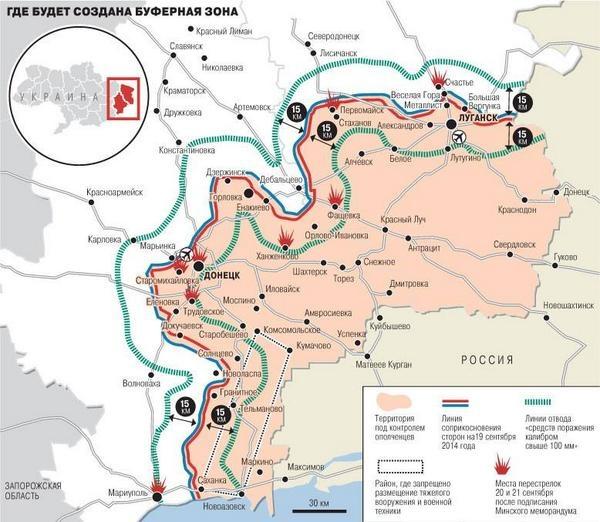
Ukrainian servicemen man positions with APCs and tanks near the town of Debaltseve, in the Donetsk region, on September 21.
KIEV, Ukraine—Less than a day after the latest moves to reduce tensions in Ukraine, the efforts were dealt a blow as Kiev said Sunday it wouldn't proceed with a withdrawal of heavy weaponry from war-torn provinces of eastern Ukraine until rebels there abide by a cease-fire signed earlier this month.
The announcement came after the two sides agreed early on Saturday in Minsk to pull back artillery and rocket-launching systems from the battle zone, and it underlined the difficulty of converting the cease-fire pact signed Sept. 5 into a lasting peace. Dozens have been killed in fighting since the deal took effect.
The latest talks came amid concern in Moscow over escalating sanctions from the West, and worries in Kiev that its military can't withstand the Russian troops and equipment that have been flowing into the country.
The Minsk agreement called for both sides to pull artillery and rocket-launching systems about 9 miles away from the combat zone. But persuading combatants to stop shooting could be a tougher matter.

For the Ukrainian government, an end to fighting would leave some major population centers of eastern Ukraine in rebel hands. Many on the Ukrainian side are in volunteer battalions and skeptical of Kiev's peacemaking efforts.
Russian-backed rebels, meanwhile, had set their sights on much larger gains, including control of the entirety of two provinces, Donetsk and Luhansk. Today, they hold less than half of both.
On Sunday, fighting continued to simmer in eastern Ukraine. Andriy Lysenko, a spokesman for Ukraine's National Security and Defense Council, said two Ukrainian soldiers were killed and eight wounded in the past day.
Explosions and gunfire were heard outside the Ukrainian port city of Mariupol, which Russian-backed rebels have been trying to take since last month, Ukrainian news services reported.

Servicemen of the Ukrainian 'Aydar' battalion patrol an area near the eastern Ukrainian town of Scshastya in the region of Luhansk on Saturday
Mr. Lysenko said that rebels fired on government troops near 22 towns and villages on Saturday and that Ukrainians returned fire in some instances. Rebels likewise accuse the government of shooting at and shelling their positions.
Mr. Lysenko said a leading point of the Minsk agreement was a cease-fire, and without one the government won't talk about implementing the pact. and the government "is not talking about" implementing the deal until it is achieved. He added that any withdrawal of Ukrainian forces "should be synchronized together with the withdrawal of Russian forces."
The withdrawal of Russian forces from Ukrainian soil is another complication in hammering out any peace agreement, because Moscow insists there are no Russians fighting on Ukrainian soil. Officials have said some active-duty soldiers may be fighting there during their vacations.
A monitoring mission in Ukraine of the Organization for Security and Cooperation in Europe issued a statement on Sunday welcoming the nine-point Minsk agreement, which aimed to create an 18-mile-wide buffer in the battle zone devoid of heavy weaponry and called for both sides to abide by the earlier cease-fire pact. The OSCE said it had 80 officials on the ground in the region to monitor compliance with the Minsk accord.

Ukrainian servicemen are pictured on their positions near eastern town of Gorlivka in Donetsk district on September 18, 2014.
.
The document signed in Minsk called again for both sides to halt military activity along the cease-fire line, with all heavy artillery and missile launchers to be withdrawn from the front line beyond their firing range.
That agreement was signed by former Ukrainian President Leonid Kuchma, Russian Ambassador to Ukraine Mikhail Zurabov, OSCE representative Heidi Tagliavini and representatives of the self-proclaimed separatist republics Igor Plotnitsky and Alexander Zakharchenko.
In a bow to Kiev, the document didn't extend any official recognition to the separatist republics, and left out the posts of the republics' representatives.
The memorandum also bans flights by military jets and drones in the conflict zone and demands that land mines be removed from the front line.
While scores of Russian citizens are likely to have died as fighters in the conflict, little is broadcast about it in the state-controlled media. Russia's annexation of Crimea has boosted the ratings of Russian President Vladimir Putin, who has ramped up nationalist enthusiasm for defending the rights of ethnic Russians in Ukraine.
On Sunday, thousands of Muscovites, led by the capital's liberal intelligentsia, demonstrated against Russia's actions in Ukraine in a "March for Peace." Protesters carried Russian and Ukrainian flags and chanted "Glory to Ukraine" as they marched along the Russian capital's boulevard ring. One protester carried a sign that read "Forgive Us, Ukraine" against the backdrop of a Ukrainian flag. Others held signs emphasizing brotherhood between the two nations.

A girl's banner reads "We're for peace" as thousands marched in downtown Moscow Sunday to demonstrate against fighting in Ukraine.
At one point, a group of counter-protesters tried to unfurl a banner calling the demonstrators "traitors," but were stopped by organizers. A few other counter-protesters heckled the pro-Ukraine demonstrators along the route of the parade, some holding flags for the Donetsk People's Republic and Novorossiya, the czarist-era name for part of southern Ukraine.
Related

No comments:
Post a Comment